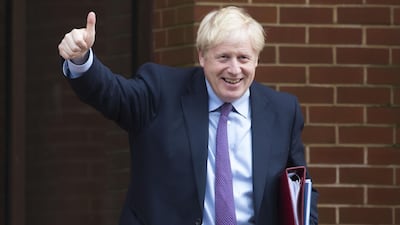When Boris Johnson ascended the steps of 10 Downing Street for the first time as prime minister last week he pledged to prioritise the fight against knife crime.
Mr Johnson’s emphasis on the issue in his first speech as UK leader reveals the extent to which violent crime now ranks alongside Brexit as a priority for the new government.
The rest of the world has started to second guess how safe they might be on Britain’s streets. US President Donald Trump claimed parts of London were a “war zone for horrible stabbing wounds” and many visitors worry over the headlines about street attacks.
The Saudi embassy in the UK has a standing warning to its citizens, urging caution when visiting the British capital. The advice followed an assault on a tourist with corrosive liquid in London’s upmarket Knightsbridge in 2017. The area, with its luxury shops and five-star hotels, is popular with visitors from the Gulf.
Stemming the rise in violence is a vital issue for the tourism industry. "The damage in economic terms could be huge," UK tourism expert Anna Hillingdon told The National.
She said frequent knife attacks and increased media coverage would have a cumulative negative effect as people decided whether or not to visit the UK and London.
She said Britain could not afford to be complacent as it weighs up whether a loss in tourism was worth spending less on policing. “The long-term damage is the damage to the brand of the UK and the brand of London ... the UK cannot afford to lose that.”
Ghaya Bani Rushaid, an Emirati student living in London, knows first-hand what it feels like to become a victim of crime.
Her bank cards and passport were stolen from her bag this month as she sat eating with friends in the High Street Kensington area.
“I didn’t expect it to happen to me,” she said.
Ms Bani Rushaid said she did not believe she had been targeted because she was from the Gulf but felt thieves were attracted to High Street Kensington because of its reputation as an affluent part of London.
She said her experience had made her more alert to the possibility of more violent crime in London.
Tourists, she said, should be made more aware of the issue. “They may need to stay away from certain areas and bear in mind that this might happen to them and take precautions,” she said.
Mr Johnson’s central pledge is 20,000 extra officers on the beat and new stop-and-search powers to target suspicious behaviour. Funds for the increase in policing will come from an emergency autumn budget and cost £500 million (Dh2.42 billion) in the first year.
To hit the ambitious target, a national policing board will be created to oversee the work.
Kit Malthouse, the government minister leading the fight against knife crime, said more police was only a starting point. "The solutions to knife crime are complex and wide-ranging," he told the BBC's Today programme yesterday.
Graham Wettone, a former sergeant with London's Metropolitan Police told The National that he was pleased to see Britain's politicians talking about investing in policing but said the challenges facing the new government could not be overstated.
“The police are demoralised. They are battered and beaten, in crisis. It is going to take a special kind of person ... [investing] much attention and commitment into turning it round,” he said.
Mr Wettone said there were deep flaws with the pledges to increase police numbers and wondered where the Home Office would find so many recruits in such a short space of time.
“I am not sure that the barrel they are fishing in has 20,000 eligible recruits,” he said.
Mr Wettone said money would be better spent on retaining experienced officers who are leaving the force.
“Cops aren’t experienced enough to know what to do and when to do it. This is the problem you will face on the street. There is not enough experience or mentors on the street,” he said.
The solution to the UK’s violent crime problem lies in understanding the recent past as well as looking at what is working elsewhere in the country, experts said.
The chief executive of the Ben Kinsella Trust – a knife-crime prevention body – said complex reasons were behind the surge in stabbings.
“It is the lack of youth support in terms of youth work, lower police numbers, a very vibrant drugs market, higher exclusion rates ... that have created an environment where knife crime and violence prospers,” Patrick Green said. “Before 2011, knife crime fell quite significantly.”
Scotland has successfully bucked the national trend when it comes to knife crime. There, the government adopted a public health approach, involving prevention and intervention activities designed to stop future offending.
In Edinburgh, the devolved government has combined conventional policing with innovation in the courts to get perpetrators into training and housing, thereby breaking the cycle of criminality.
“We need stronger enforcement and it has worked in Scotland.
“In Scotland they do everything they can to keep you out of trouble,” Mr Green said.

